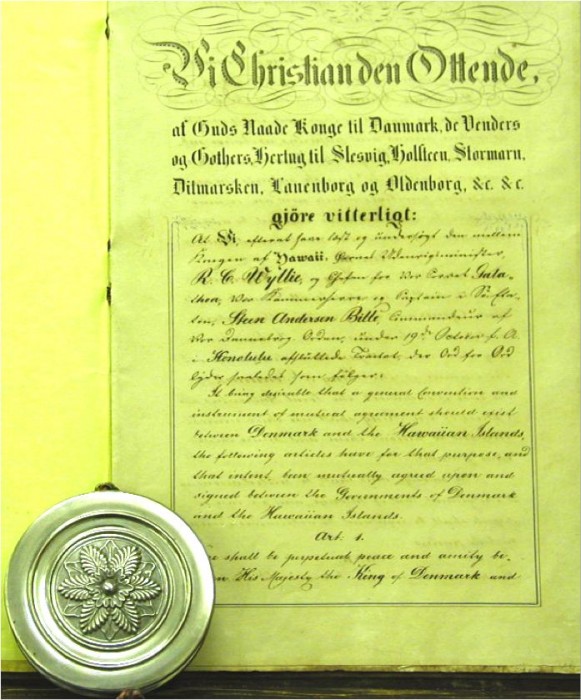 The first friendship treaty the Hawaiian Kingdom entered into as a sovereign state was with Denmark on October 19, 1846. Other friendship treaties followed with Hamburg, succeeded by Germany, (January 8, 1848), the United States of America (December 20, 1849), the United Kingdom (July 10, 1851), Bremen, succeeded by Germany, (March 27, 1854), Sweden-Norway, now separate states, (April 5, 1855), France (September 8, 1858), Belgium (October 4, 1862), Netherlands (October 16, 1862), Luxembourg (October 16, 1862), Italy (July 22, 1863), Spain (October 9, 1863), Switzerland (July 20, 1864), Russia (June 19, 1869), Japan (August 19, 1871), Austria-Hungary, now separate states (June 18, 1875), Germany (March 25, 1879), and Portugal (May 5, 1882). Neither the Hawaiian Kingdom nor any of these states expressed any intention to terminate any of the treaties according to the provisions provided in each of the treaties, and therefore remain in full force and effect.
The first friendship treaty the Hawaiian Kingdom entered into as a sovereign state was with Denmark on October 19, 1846. Other friendship treaties followed with Hamburg, succeeded by Germany, (January 8, 1848), the United States of America (December 20, 1849), the United Kingdom (July 10, 1851), Bremen, succeeded by Germany, (March 27, 1854), Sweden-Norway, now separate states, (April 5, 1855), France (September 8, 1858), Belgium (October 4, 1862), Netherlands (October 16, 1862), Luxembourg (October 16, 1862), Italy (July 22, 1863), Spain (October 9, 1863), Switzerland (July 20, 1864), Russia (June 19, 1869), Japan (August 19, 1871), Austria-Hungary, now separate states (June 18, 1875), Germany (March 25, 1879), and Portugal (May 5, 1882). Neither the Hawaiian Kingdom nor any of these states expressed any intention to terminate any of the treaties according to the provisions provided in each of the treaties, and therefore remain in full force and effect.
These treaties have the “most favored nation” clause, and secure the equal application of commercial trade in the Hawaiian Islands to all treaty partners. These treaties have all been violated by the United States through the unlawful imposition of the Merchant Marine Act (1920)—also known as the Jones Act—that has secured commercial control over the seas to United States citizens, which has consequently placed the citizens of these foreign states at a commercial disadvantage (46 U.S.C. §883-1). The clause is designed
“to establish the principle of equality of international treatment. The test of whether the principle is violated by the concession of advantages to a particular nation is not the form in which such concession is made, but the condition on which it is granted; whether it is given for a price, or whether this price is in the nature of a substantial equivalent, and not a mere evasion (Black’s Law Dictionary 1013 (6th ed. 1990).”
Treaties “are legally binding, because there exists a customary rule of International Law that treaties are binding. The binding effect of that rule rests in the last resort on the fundamental assumption, which is neither consensual nor necessarily legal, of the objectively binding force of International Law (L. Oppenheim, International Law, vol. 1, 794 (7th ed. 1948),” states Oppenheim. “No distinction should be made between more or less important parts of a treaty as regards its execution. Whatever may be the importance or the insignificance of a part of a treaty, it must be executed in good faith, for the binding force of a treaty covers all its parts and stipulations equally (Id., 829).”

Every state or successor state that Hawaii has a treaty with should be reeducated on Hawaii’s political history and current status. All treaties would need to be updated as well. This would greatly aid in putting international pressure on the U.S. to comply with international law and begin deoccupation.
Wow. Hawaii certainly has the power to alter the world economy. I don’t know if it could be good or it could be bad, but either way, this significance of this occupation, especially when de-occupation comes, does have an unimaginable effect throughout the entire international community.
But I am hopeful and positive on this perspective: When Hawaii does get de-occupied, we will no doubt be enjoying freedoms and privileges, especially economic freedoms, that this aina along with its people have been deprived of for so long. Plus with the immense yearly compensation for this occupation that the United States has to pay under law, it will make living in the H.K. even better. We’ll also be living under a government that not only is legal, we’ll be living under a government that deeply cares for the welfare of the nation and the country itself unlike the puppet regime who implies that their system is the best in the world, yet they’re almost nothing compare to Hawaiian values. And if anyone things that the H.K. Government would not care for its inhabitance and the country itself, history can certainly contradict that ludicrous notion. For instance, if the H.K. did not care for its inhabitance and the country itself, they would’ve declared war upon the United States during the 1893 overthrow and guess what? The H.K. would no doubt lose and worst of all, they would lose their country itself upon the terms of a treaty of surrender. The Hawaiian Kingdom would cease to exist forever and THAT would be legal. Luckily that worst-case scenario did not happen and I don’t want to see that happen in the future. The H.K. may be week in standing army to some people
But they are NOT idiots! And THAT is an absolute fact!
Matter of speaking, in H.K. society, idiocy is not only frowned upon, it is illegal in certain aspects.